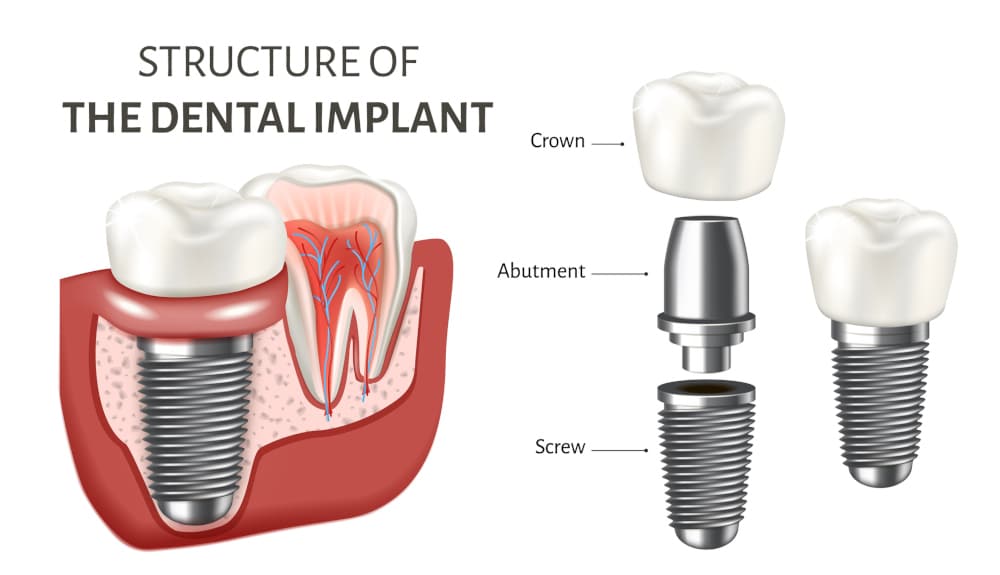This article explains how long dental implants typically last and what factors affect their longevity. Dental implants are a popular form of permanent dental implants that provide a reliable option for permanent teeth replacement. Many patients ask, “how long do dental implants last?” while others wonder, “do dental implants last forever?” In this guide, we break down the answer in clear, everyday language designed for a Canadian audience.
Key Takeaways:
- Dental Implant Basics: A short explanation of what dental implants are and how they replace missing teeth.
- Longevity Concerns: Reasons why many patients worry about durability.
- Average Lifespan: A quick look at what you can expect from your implant.
- Care and Maintenance: Practical advice to help your implant last.
- Expert Opinions: Insights from dental doctors and trusted sources.
What Are Dental Implants Made Of?
When considering dental implants, one common question is, “what are dental implants made of?” The answer lies in the materials used, which are chosen for their strength and compatibility with the body.
Materials Comparison
- Titanium:
- Titanium is a strong metal that resists corrosion.
- It bonds well with the jawbone, helping to secure the implant.
- Zirconia:
- Zirconia is a ceramic material that looks very natural.
- It is an excellent choice for patients who prefer a metal-free option.
Components of an Implant
A typical dental implant consists of three parts:
- Implant Post: The metal screw placed into the jawbone.
- Abutment: The connector that links the implant post to the crown.
- Crown: The custom-made tooth that you see in your smile.
Both titanium and zirconia are used to create permanent teeth implants that work like real teeth.

Average Lifespan of a Dental Implant
On average, dental implants can last from 15 to 25 years or even longer when cared for properly. Here is a brief overview:
- Implant Post: With good bone integration, the post can last a lifetime.
- Abutment and Crown: These parts might need replacement after 10 to 15 years because of normal wear.
A key question many patients ask is, “how long do teeth implants last?” The answer depends on several factors, but with regular care, the implant itself is built to last.
Factors That Influence Implant Longevity
A combination of personal behaviours, the dentist’s work, and your lifestyle determines the durability of your implant. The key factors to take into account are listed here.
Patient-Related Factors
- Oral Hygiene:
Good daily care is essential. Brushing, flossing, and using an antiseptic rinse can prevent infections that might harm the implant. - Smoking and Tobacco Use:
Tobacco slows healing and can weaken the bond between the implant and your jawbone. - Chronic Illnesses:
Conditions like diabetes or osteoporosis may impact healing and overall success. - Jawbone Health:
A strong and healthy jawbone helps to hold the implant firmly in place.
Dentist-Related Factors
- Dentist’s Training and Technique:
Your dentist’s experience can greatly affect how well the implant is placed. - Procedure Accuracy:
Accurate placement and secure fitting increase the chance that the implant will last. - Material Quality:
Using high-quality materials in the implant process is key for long-term success.
Lifestyle Factors
- Diet and Nutrition:
A balanced diet supports healing and long-term health. - Teeth Grinding (Bruxism):
Grinding can put extra pressure on implants. Using a night guard can help protect them. - Regular Dental Visits:
Routine check-ups allow early detection of any issues before they become serious.
In discussing overall durability, some also ask, “how long do implants last?” The answer is clear: it depends on these combined factors and the care you take each day.

How to Make Dental Implants Last Longer
Maintaining your implant is essential for its longevity. Here are some practical tips to help your new tooth stay in great shape:
- Follow a Daily Oral Care Routine:
Brush gently with a soft-bristled toothbrush and use a mouthwash recommended by your dentist. - Watch Your Diet:
Avoid very hard, sticky, or crunchy foods that can put extra strain on your implant. - Use a Night Guard:
If you grind your teeth at night, a night guard will help reduce the risk of damage. - Schedule Regular Professional Cleanings:
Regular visits to your dentist help catch any potential issues early. - Look Out for Early Signs of Problems:
Detecting any signs of infection or loosening early can prevent major complications.
Following these steps can help answer the question, “do dental implants last forever?” by ensuring your implant remains in good condition for many years. (Remember: proper care is the key to their long life.)
Common Reasons Why Implants Might Fail Early
Even though dental implants are built to be durable, there are some reasons why they might not last as long as expected:
- Infection or Peri-Implantitis:
An infection around the implant can cause serious problems if not treated quickly. - Poor Bone Bonding:
Inadequate healing or a weak jawbone may prevent the implant from integrating properly. - Mechanical Issues:
Problems such as loose screws or a broken crown can affect the stability of the implant. - Surgical Error:
Mistakes during the placement process can compromise the implant’s longevity. - Rare Allergic Reactions:
Although uncommon, some patients may react to the implant material.
By being aware of these risks, you can work with your dental care team to address them promptly if they arise.
Early vs. Late Implant Failure
It is important to understand the difference between early and late implant failure:
- Early Failure (Within 3–6 Months):
Early problems often stem from poor healing or issues with initial bone bonding. You might notice the implant feels loose, or you experience unexpected pain. - Late Failure (Years Later):
Late failure is usually linked to wear and tear or gradual bone loss. Even if your implant lasts many years, regular check-ups are important to catch any changes.
Symptoms to Watch For:
- Persistent or increasing pain
- Movement or looseness of the implant
- Redness, swelling, or signs of infection
If you detect any of these signs, contact your dental provider right away.
Can Dental Implants Be Replaced or Repaired?
Over time, some parts of your dental implant may need attention:
- Crown Replacement:
Often, only the crown (the visible part) needs to be replaced due to normal wear. - Repair Work:
In certain cases, procedures like bone grafting can fix an implant that isn’t performing as it should. - Repair Frequency:
Regular care and monitoring mean that most repairs are minor and not very frequent.
Knowing that implants can be repaired reassures many who ask, “are dental implants permanent?” With the right care, they are meant to be a long-term solution.
Comparing Longevity: Dental Implants vs. Bridges vs. Dentures
It is useful to compare the lifespan of various dental restorations:
| Restoration Type | Typical Lifespan | Maintenance Needs | Long-Term Cost |
| Dental Implants | 15–25+ years | Regular oral care & check-ups | Higher initial cost |
| Bridges | 5–15 years | Periodic replacements | Lower upfront cost |
| Dentures | 5–8 years | Frequent cleaning & adjustments | Lower initial cost |
Dental implants generally offer the best durability for those looking for permanent teeth implants.
What Dentists Say About Implant Durability
Dental professionals agree that the success of an implant depends on both the placement technique and the patient’s care. Recent studies indicate that enhanced materials and honed techniques have lengthened how long implants survive.
Dr. Brigette Hudy comments, “When patients question, ‘how long can dental implants last?’ we can safely respond that, with proper care, these implants may serve as a permanent solution. Preventing any problems, therefore, depends on following a rigorous care plan and going to frequent check-ups.
For more details on the best practices and latest research, you may visit the Canadian Dental Association.

Dental Implant at The Art of Dentistry
At The Art of Dentistry, every step of the implant process is done with care and accuracy. Count on us! Your implant will be a good fix for missing teeth, as we advanced techniques and premium materials.
Our staff is dedicated to assisting you in knowing your choices and selecting a treatment plan that meets your requirements. Many people wonder, “Are dental implants permanent?” and we are happy to provide treatments meant to last long. Our method for permanent teeth implants is meant to provide a natural-looking, lasting result, whether you require implants for one gap or several teeth.
Conclusion
All things considered, responding to the relatively widely spread and asked question – “how long do dental implants last” calls for numerous considerations like the materials utilized, the standard of treatment, and your personal practices. The following are the key ideas:
- Made of strong materials, including titanium or zirconia, dental implants. When asked, “what are dental implants made of?” the response is that these materials provide consistent support and good bonding with the jawbone.
- Dental implants usually survive between 15 and 25 years with good maintenance. They are thus quite good for permanent teeth replacement in this manner.
- Many people frequently ask, “how long do implants last?” The response varies with personal oral hygiene, dental treatment, and lifestyle decisions.
- Regular dental checkups, avoiding bad habits like tobacco usage, and straightforward everyday activities all help prolong the life of your implant.
- Though some might wonder, “do dental implants last forever?”, the reality is that the lifetime of these implants is decided by appropriate care and frequent check-ups.
- At last, should issues develop, choices to repair or replace implant components exist. Often, only the crown has to be replaced; the whole implant may not need replacement.
Following these tips and cooperating closely with your dental care professional will help you to make sure your dental implant stays a robust and durable solution. Taking an active role in your own oral health includes remembering to ask questions like “how long do teeth implants las,” and “are dental implants permanent.”
For more trusted information, visit the Canadian Dental Association or speak with your local dental care provider.
FAQs: Dental Implant Longevity
- Can implants really last a lifetime?
Built for long-term success, dental implants can, with appropriate maintenance, last a lifetime. Every 10 to 15 years, though, the crown—the visible component—may have to be replaced because of daily wear and tear. Keeping your implant in excellent form over the long run depends on good oral hygiene and frequent dental check-ups. - How often should I get check-ups?
The health of your implant depends much on regular check-ups. Most dental experts advise a visit every six months to a year. Your dentist will monitor how well your implant is performing, make sure there are no indications of infection or loosening, and offer recommendations on any more required care during these appointments. - What happens if the implant fails after 10 years?
Though they have a good success rate, dental implants might cause problems over time. Your dentist will assess the situation if an implant exhibits indications of failure after ten years, whether caused by infection, poor bone bonding, or mechanical problems. Sometimes, it might be feasible to fix or replace a component of the implant—such as the crown, or, in rare situations, a new implant could be needed. Regular follow-up treatment catches any problems early, hence lowering the likelihood of total failure. - Can I upgrade my implant crown later?
Certainly, you can subsequently improve your implant crown. Many patients decide to replace the crown for a better appearance or to take advantage of the most recent material and technological developments. Usually staying intact, the implant post may be changed as required; the crown—the visible portion of your tooth—can be replaced as required. Your implant’s lifetime will allow you to appreciate its current look and feel because of its adaptability.
Any issues particular to your circumstances should be addressed immediately with your dental care provider. Based on the most recent techniques and your individual oral health requirements, they will direct you.

